It started with a class activity at a tiny seaside school and quickly spread across the world. In just over two months, art teacher Park Lee (李公元) amassed over 1,300 submissions of self portraits in face masks from Taiwan and abroad, including contributions from a Brazilian radio host, New York fashion designer and a health worker on the COVID-19 frontlines in Belgium.
After his 17 fifth-graders at Yueming Elementary School (岳明國小) finished their portraits, Lee created a Facebook group in mid-March and called for submissions. He received over 100 in the first two days, and while the posts have slowed down in recent weeks, they’re still trickling in.
This isn’t the first time Lee’s students have garnered national attention. In 2018, they found a functional Canon G12 camera while cleaning a beach near their school, and eventually found the Japanese photographer who lost the camera over 200km away in Ishigaki island. The photographer visited Taiwan to thank the students, who in turn headed to Tokyo to perform a traditional puppet show based on the events.
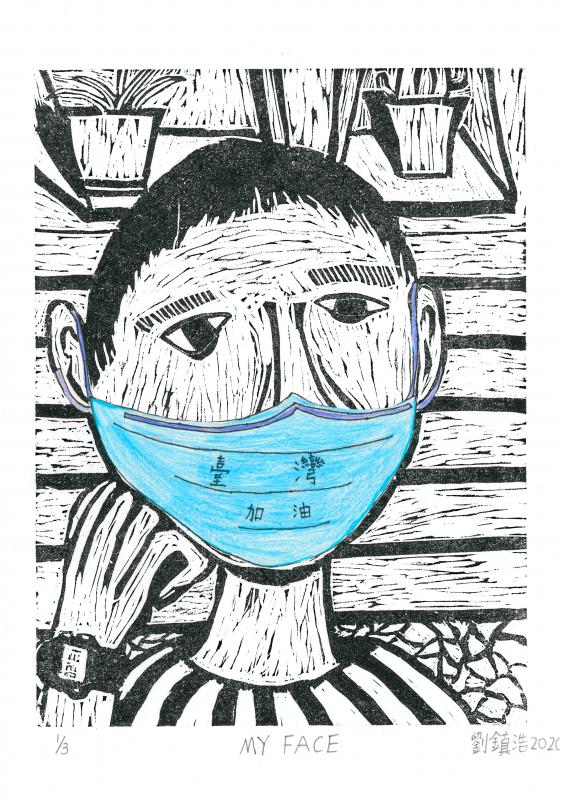
Photo courtesy of Park Lee
Lee says he made a lot of international Facebook friends through the incident, which helped spread his face mask project to unexpected corners of the world, despite the group’s name only being in Chinese.
Lee’s self-portrait project was inspired by 88-year-old art educator and children’s book author Cheng Ming-chin (鄭明進). In early March, when COVID-19 cases surged in Taiwan, Cheng mailed Lee four self portraits of him and three grandchildren wearing face masks. Cheng told Lee that they wanted to do something that highlighted the difficulties that came with the crisis.
“It is a powerful visual testament to the ‘pandemic era,’” Lee says. “And it’s something that anyone could do when they’re stuck at home. It’s a good time to clear one’s mind and observe. It helps one to reflect on the situation and also is a vehicle to encourage others.”
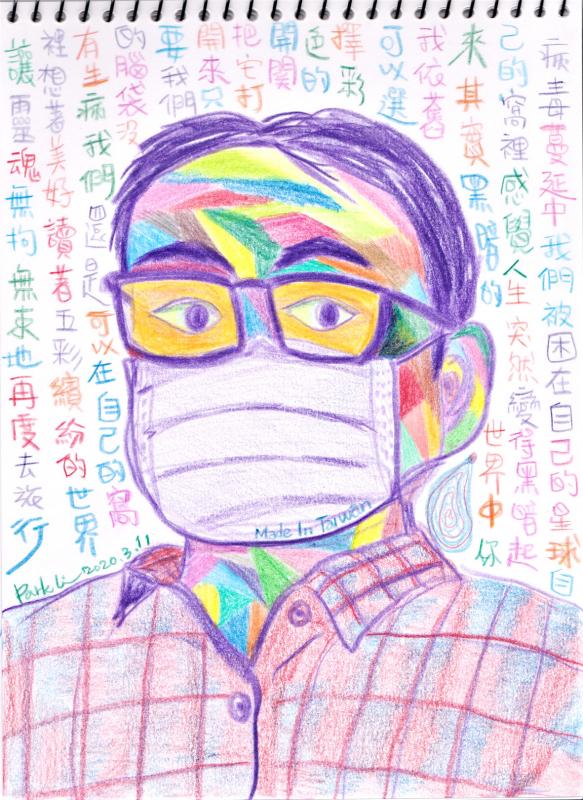
Photo courtesy of Park Lee
Many pieces include uplifting messages. Lee filled the white space of his self-portrait with a note reminding people that one can choose to have color in their life even when trapped at home.
“As long as our minds aren’t ill, we can still think of wonderful things in our homes and observe this colorful world, allowing our souls to travel without constraint,” he writes.
One of his students wrote “virus criminal” (病毒犯人) on his portrait.
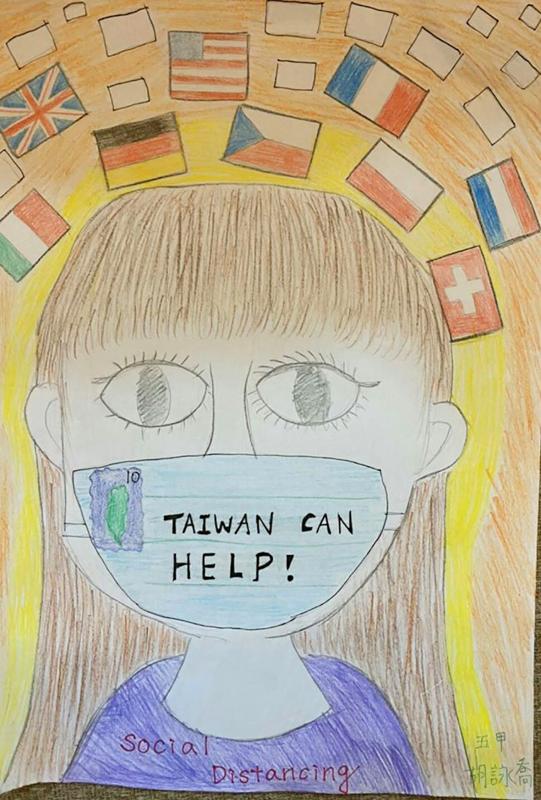
Photo courtesy of Park Lee
“He felt that being required to put on a face mask everyday and having his movements restricted made him feel like a criminal,” Lee says.
Another piece depicting Guanyin, the Buddhist goddess of mercy, included the caption: “If you wear a face mask, you’re a bodhisattva because you’re helping yourself and others too.”
The surprise submissions appeared from the beginning. One of the first submissions came from Brazilian radio host Verenice Eugionio Sipriano, who continued to contribute with messages in Portuguese.
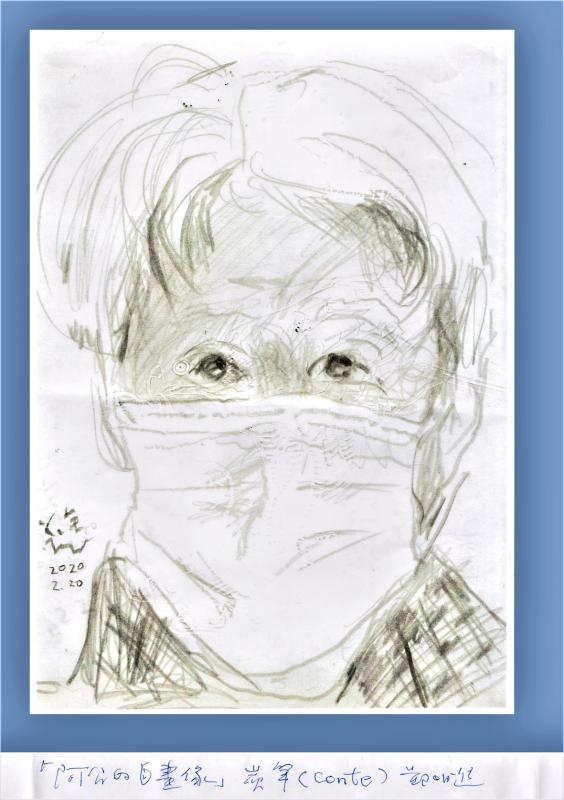
Photo courtesy of Park Lee
Yin Huei-ju (殷惠茹), a health worker of Taiwanese descent fighting on the pandemic frontlines in Belgium, began submitting portraits of her coworkers. Nina Edwards, a fashion designer in New York, submitted several fashion-style portraits in locations around the world. Notable pieces by locals include one by autistic 25-year-old artist Wu Chi-liang (吳起良), and professional illustrators have also turned in intriguing work.
Lee especially liked the portraits that came from New Taipei City’s Qingshan Junior High School (青山國中). The teacher had them add vibrant masks to the black-and-white woodblock print self-portraits they made earlier this year.
There has just been one minor controversy so far, when someone submitted a piece that depicted blood on it and accused China of starting the pandemic. Lee says he left the piece up to uphold freedom of speech, but also reminded the artist to be more considerate with future posts.

Photo courtesy of Park Lee
“I want to keep things flexible. Some illustrators turned in portraits of animals or fruit. I think that’s okay too. I just want people to express themselves and retain a more colorful state of mind even in these darker times,” Lee says.
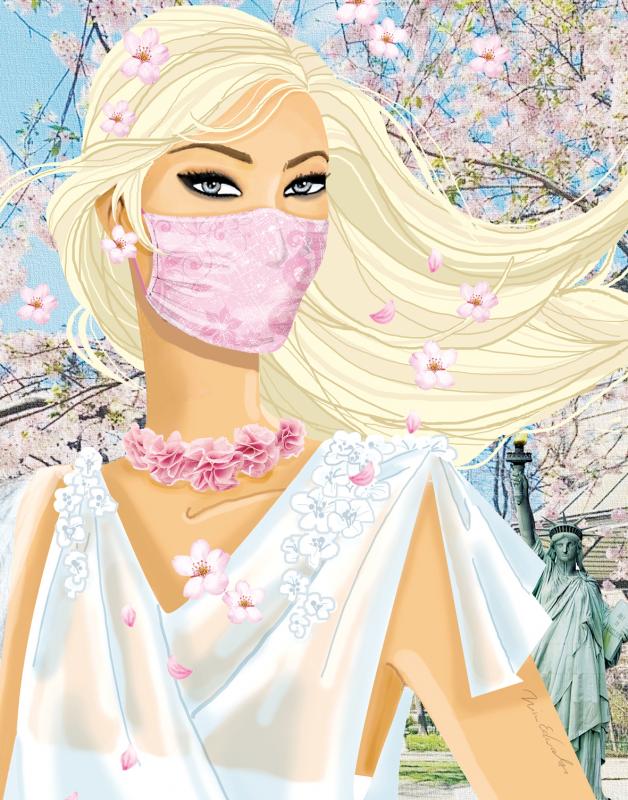
Photo courtesy of Park Lee

May 18 to May 24 Pastor Yang Hsu’s (楊煦) congregation was shocked upon seeing the land he chose to build his orphanage. It was surrounded by mountains on three sides, and the only way to access it was to cross a river by foot. The soil was poor due to runoff, and large rocks strewn across the plot prevented much from growing. In addition, there was no running water or electricity. But it was all Yang could afford. He and his Indigenous Atayal wife Lin Feng-ying (林鳳英) had already been caring for 24 orphans in their home, and they were in

On May 2, Chinese Nationalist Party (KMT) Chairman Eric Chu (朱立倫), at a meeting in support of Taipei city councilors at party headquarters, compared President William Lai (賴清德) to Hitler. Chu claimed that unlike any other democracy worldwide in history, no other leader was rooting out opposing parties like Lai and the Democratic Progressive Party (DPP). That his statements are wildly inaccurate was not the point. It was a rallying cry, not a history lesson. This was intentional to provoke the international diplomatic community into a response, which was promptly provided. Both the German and Israeli offices issued statements on Facebook

President William Lai (賴清德) yesterday delivered an address marking the first anniversary of his presidency. In the speech, Lai affirmed Taiwan’s global role in technology, trade and security. He announced economic and national security initiatives, and emphasized democratic values and cross-party cooperation. The following is the full text of his speech: Yesterday, outside of Beida Elementary School in New Taipei City’s Sanxia District (三峽), there was a major traffic accident that, sadly, claimed several lives and resulted in multiple injuries. The Executive Yuan immediately formed a task force, and last night I personally visited the victims in hospital. Central government agencies and the

Australia’s ABC last week published a piece on the recall campaign. The article emphasized the divisions in Taiwanese society and blamed the recall for worsening them. It quotes a supporter of the Taiwan People’s Party (TPP) as saying “I’m 43 years old, born and raised here, and I’ve never seen the country this divided in my entire life.” Apparently, as an adult, she slept through the post-election violence in 2000 and 2004 by the Chinese Nationalist Party (KMT), the veiled coup threats by the military when Chen Shui-bian (陳水扁) became president, the 2006 Red Shirt protests against him ginned up by